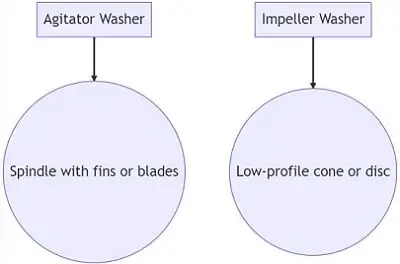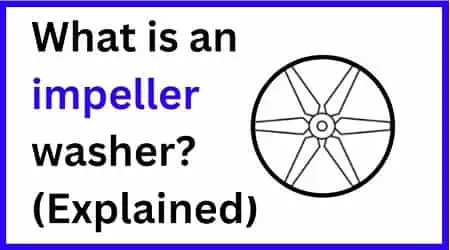In the world of laundry appliances, the impeller washer has been making waves in recent years.
But what exactly is an impeller washer, and should you consider investing in one for your laundry needs?
In this article, we will explore what an impeller washer is, how it works, and its features, benefits, and drawbacks.
In a Nutshell
An impeller washer is a type of top-loading washing machine that uses a low-profile, cone-shaped disc in place of a traditional pole-style agitator with fins and blades.
What is an impeller washer?
An impeller washer uses a low-profile cone or disc at the bottom of the drum to create a gentle yet effective washing action instead of a central agitator to clean clothes.
The wash plate or impeller rotates in a manner that creates turbulent currents in the water, which helps in washing clothes.
So, it’s the impeller’s unique design that ensures the clothes are not tangled and that there is enough water and detergent to clean them.
Also, in most impeller washers, the water level is automatically adjusted based on the weight of the load, which saves water and energy.
And most importantly, impeller washers use less water and detergent than traditional top-loading washing machines with agitators, and they are also gentler on fabrics.
Benefits of an impeller washer
Impeller washers have several features that make them stand out from traditional washers. Some of these features include:
Energy Efficiency
Impeller washers use less water and detergent than traditional washers, making them more energy-efficient.
Gentle on clothes
The impeller’s design ensures that the clothes are not tangled, which reduces wear and tear on fabrics.
Large Capacity
Impeller washers have large capacities, which means that you can wash more clothes in one go.
Automatic Water Level Adjustment
Most impeller washers automatically adjust the water level based on the weight of the load, which saves water and energy. Check the user manual to see if your washer has this feature or not.
Multiple wash cycles
In most cases, the impeller washers come with multiple wash cycles, such as quick wash, delicate wash, and heavy-duty wash.
Faster wash times
Impeller washers have faster wash times than traditional washers, which means that you can wash more clothes in less time.
Drawbacks of an impeller washer
Like any technology, impeller washers also have some drawbacks.
May not give the desired results if the clothes are heavily soiled
Impeller washers may not be suitable for heavily soiled clothes as they have limited cleaning power compared to traditional washers.
May be expensive
Impeller washers can be more expensive than agitator washers, making them less accessible for some consumers.
May require more maintenance
Impeller washers may require more maintenance than agitator washers due to their more complex design.
This could include regular cleaning, filter replacements, or other maintenance tasks.
May not be ideal for certain fabrics
Some delicate fabrics may not be suitable for washing in an impeller washer, as the gentle washing action may not be enough to remove stains or dirt.
Agitator vs. Impeller Washers: Which One to Choose?

Both agitator and impeller-based washers have their advantages and disadvantages, but which one is right for you?
In order to understand this better, you need to understand how they work.
Now that you know what an impeller washer is, let’s take a quick look at what an agitator-based washer is and how it works in order to make the right choice.
What is an agitator washer?
An agitator washer has a central spindle with fins or blades that move the clothes around in the drum.
These washers use more water and energy than impeller washers and are more suitable for heavily soiled laundry.
Agitator washers are also louder and more abrasive on clothes, making them less ideal for delicate fabrics.
Agitator vs. Impeller: Which One Is Better?
The answer to this question depends on your individual needs and preferences.
If you have a large family and frequently deal with heavily soiled laundry, an agitator washer may be the better choice for you.
However, if you want a more energy-efficient and gentle washing machine that can handle different types of fabrics, an impeller washer might be the right fit.
Benefits of Using an Agitator Washer
- Suitable for heavily soiled laundry.
- Shorter wash cycle times.
- Aggressive cleaning action.
Disadvantages of Using an Agitator Washer
- Uses more water and energy.
- Loud and abrasive on clothes.
- Smaller capacity.
Key benefits of using an impeller washer
- Energy and water-efficient.
- Large capacity.
- Gentle on clothes.
Major disadvantages of using an impeller washer
- May not be suitable for heavily soiled laundry.
- Can be a bit expensive.
- May have higher maintenance (which varies from brand to brand).
Also Read: Difference between Tumble Wash and Pulsator OR Impeller Wash
How Do You Choose the Right Type of Washer for You?
Before you make a decision, consider following the below checklist:
- Size of your household (this correlates with the amount of laundry you will be doing).
- Frequency of laundry loads (this will help you do the cost-benefit analysis).
- Types of fabrics you wash (if you have more delicate fabrics, impellers work better than agitators).
- Check the water and energy efficiency of the washer.
- If you are too conscious of the noise level, then this is something that you should also consider.
- Make sure it fits your budget.
- Check the maintenance cost (speak to the salesperson or local repair person).
- Do a cost-benefit analysis (consider the star rating of the washer and the frequency of washing).
Based on the above factors, you should be able to make the right decision.
Final Thoughts
Choosing between an agitator and an impeller washer depends on your individual needs and preferences.
Agitator washers are suitable for heavily soiled laundry and have a shorter wash cycle time.
Impeller washers are more energy and water-efficient, have a larger capacity, and are gentler on clothes. Consider the factors mentioned above to choose the right washer for you.
Frequently Asked Questions
How do I clean my impeller washer?
Cleaning an impeller washer is similar to cleaning a traditional washer. You can run a hot water cycle with bleach or vinegar to clean the drum and eliminate any odors.
Can I use regular detergent in an impeller washer?
Yes, you can use regular detergent in an impeller washer, unless the user manual of the washer explicitly states otherwise. That being said, it is recommended to use less detergent than what you would use in a traditional washer to prevent excessive suds.
Are impeller washers more expensive than traditional washers?
Impeller washers can be more expensive than traditional washers, but it depends on the brand and model. However, the energy and water savings can offset the initial cost in the long run.
You May Also Like
- How to remove the agitator from Maytag washing machine?
- What is a digital inverter motor in the washing machine?
- What is Diamond Drum technology in Washing Machine?
- What is a Water Booster Pump in Washing Machine? (Explained)
- What is Extra Rinse in Washing Machine?
- How Does the Bleach Dispenser Work In Washing machine?
- What do Stickers In Washing Machine Indicate?
- What is Soil Level in Washing Machine?
- What is a Hall Sensor in a Washing Machine? (Explained)
- What is AddWash in Samsung washing machines?
- What is FlexWash in Samsung washing machine?
- Can you replace the door glass on a washing machine?
- What is a permanent press wash cycle in the washing machine?
- What is tCL in an LG washing machine?
- What is Fuzzy logic in a Washing Machine? (Explained)
- What is Ecobubble in Samsung Washing Machine?
- How to Hook up a Washing Machine? (Explained)

